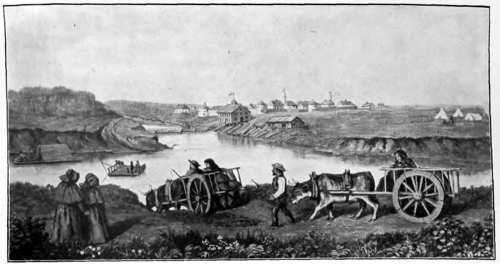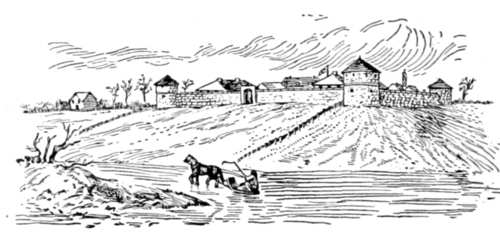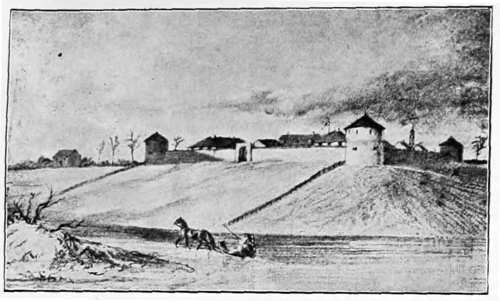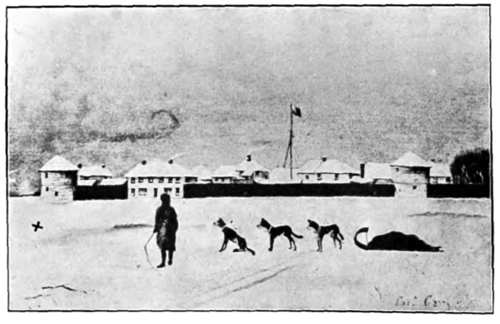|
The struggle has always been between the
masses and the classes. Privilege always strives to confine itself to a
few. It could not be but that the echoes of the great British Reform
Bill of 1832 should reach even the remote banks of Red River. The
struggle for constitutional freedom was also going on in Upper Canada,
as well as in Lower Canada where the French-Canadians were fighting
bitterly for their rights. Besides all this in the Red River Settlement
the existence of a Company store—a monopoly—could never prove
satisfactory to a community of British blood. Had the Colony shop been
ever so justly and honestly conducted it could not be popular, how much
less so must it have been in the hands of Alexander Macdonell, the
peculator and deceiver.
It is true the Company store, of
which we speak, was not that of the Hudson's Bay Company proper, but
rather the possession of Lord Selkirk's heirs.
Gradually the rulership was coming under
the direction of Governor Simpson, though there was the local Governor
who was nominally independent.
Even when Governor Simpson was invoked, it
is to be remembered that he and his company were the embodiment of
privilege. But the Governor was a surprisingly shrewd man. He saw the
aspiration after freedom, of both Scottish and French Settlers. True,
gaunt poverty did not stalk along the banks of Red River as it had done
in the first ten years of the Colony, but just because the people were
becoming better housed, better clad, and better fed, were they becoming
more independent. The unwillingness to be controlled was showing itself
very distinctly among the French half-breeds as they grew in numbers and
dashed over the prairies on their fiery steeds. They were hunters,
accustomed to the use of firearms and were, therefore, difficult to
restrain.
The Governor's policy clearly
defined in his own mind became, for the next ten years, the policy of
the Company. We have seen that the Governor built Lower Fort Garry, and
he regarded this as his residence, nearly twenty miles down the river
from the Forks, which was the centre of French influence. Even before
doing this in 1831 he had, in the year preceding this, as Ross tells us,
built a small powder magazine
at Upper Fort Garry, and it goes without saying that rulers do not build
powder magazines for the purpose of ornament.
In 1834, as we learn from Hon. Donald
Gunn, who was then a resident of Red River Settlement, and who has left
us his views in the manuscript afterward published coming up to 1835, a
most serious revolt took place among the Metis. Gunn's account is vivid
and interesting.

The Sisters The Ferry The Forks Fort Garry Site of
Fort Gibraltar
Pontoon Bridge French Half-breeds with Ox-carts
RED AND ASSINIBOINE RIVERS
FORT GARRY
(From Oil painting of Mr. W. Frank Lynn made in 1872, now in
possession of the Author.)
The French half-breeds were entirely
dependent upon hunting, trapping or voyaging. One hundred or one hundred
and fifty men were required to transfer goods, furs, etc., from the
boats during the time of open water. Generally they received advances
from the Fur Company at the beginning of summer, for they were always in
debt to the company. On the close of the open season they were paid the
balance due them. After a few days of idleness and gossip the money
would be spent and want would begin to press them. A new engagement with
an advance would follow. The agreement was signed, and so like an
endless chain, the natives were always held to the Company's interest.
At Christmas, these workmen received a portion of their advance, and as
is well known, the company relaxed somewhat its rules as to liquor
selling at this season. At this Christmas time of 1834 payments were
being made and indulgence
was supreme, when a French half-breed named Larocque entered the office
of the accountant, Thomas Simpson, a relative of Sir George, and
demanded his pay in a disrespectful way. Simpson replied somewhat
roughly, which led Larocque to insult the officer of the company.
Simpson seized the fire poker and striking Larocque's head made an ugly
wound on his scalp.
Larocque's companions retired
without violence, but on returning home, gathered the violent spirits
together, came back to Fort Garry and demanded that Thomas Simpson
should be given up to them for punishment, with the threat that if this
were not granted, they would destroy the Fort, and take Simpson by
violence. This being refused them, the Metis returned to their homes to
prepare themselves for action, and began the war songs and war dances of
their savage ancestors in true Indian style. Governor Christie, the
local authority, took with him Chief Factor Cameron, Robert Logan and
Alexander Ross, chief men of the Settlement, and visited the gathering
of the Metis. One of the deputation writes that "they resembled a troop
of furies more than human beings." For some time the mob refused the
approaches of the officers of the Company. At length the quarrel was
settled by the Company agreeing to pay the voyageur's wages in full, and
that he
should be allowed to remain at home. Probably, however, the most
acceptable part of the concession, was the gift by the Company of a
"ten-gallon keg of rum and tobacco."
Next spring another demonstration was made
by the Metis for other demands, but these were refused.

Exterior View of Fort Garry
Then, from every direction came the
imperious suggestion that some more effective form of government should
be adopted. This was granted. True, Governor Simpson did not succeed in
satisfying all the Settlers, though in this respect he found it easier
to supply the volatile French-Canadian hunters, than the hard-headed
people of British origin. The method of Governor Simpson, along with the
London Board
of the Hudson's Bay Company choosing the Council of Assiniboia,
certainly did smack of the age of Henry VIII. or Charles I. in English
history.
The Council consisted of fifteen members,
viz.: the Governor-in-Chief Simpson, the Local Governor Christie, the
Roman Catholic Bishop, two Church of England clergymen, three retired
Hudson's Bay Company officers, the leading doctor of the Colony, Sheriff
Ross, Coroner McCallum, and three leading business men, viz.: Pritchard,
Logan and McDermott. It is noticeable that though the French element
numbered about one-half of the people, that only one Councillor besides
the Bishop was given them, and this was Cuthbert Grant, now settled down
from the period of his Bois-brulés impulsiveness to be the Warden of the
Plains, with an influence over the Metis, that can only be described as
magical.
Judged by the methods of representative
government the Council was rather a burlesque.
Sheriff Alexander Ross, though a member of
the Council, says: "To guard against foolish and oppressive acts, the
sooner the people have a share in their own affairs the better. It is
only fair that those that have to obey the laws should have a voice in
making them."
Hon. Donald Gunn, who was not on the
Council, says: "The majority of the Council thus appointed
were, no doubt, the wealthiest men in the Colony and generally
well-informed, and yet their appointment was far from being acceptable
to the people who knew that they were either sinecurists or salaried
servants of the Hudson's Bay Company, and consequently were not the
fittest men to legislate for people who retained some faint recollection
of the manner in which the popular branch of the legislature in their
native land was appointed, and who never ceased to inveigh against the
arbitrary manner in which the Governor-in-chief chose the legislators."
Notwithstanding the writer's perfect
sympathy with both of these opinions, it is but fair to state that the
Council of Assiniboia did in ordinary times do many things which were
most beneficial and helpful to the Red River Community.
Its most distressing failures were
in those things which are very essential. (1) Being a compromise body it
had no power of progressive development, and in the whole generation of
its existence it did practically nothing to advance the public,
intellectual, or moral interests of the people. (2) Perhaps its most
serious breakdown took place, as we shall see, in the failure of its
judicial system. Executive power it had none, as seen in the cases where
jail-delivery took place again and again by the friends of the
prisoners boldly extricating whom they would. (3) But most alarming and
miserable was its failure to act in its moribund days, when it allowed,
as we shall see, a mob to seize Fort Garry and bring in an era of
disorder which made every self-respecting British subject blush with
shame.

South and East Faces, 1840 From sketch by wife of Governor
Finlayson.

East Face In 1882, When Fort Was Dismantled
(From painting in author's possession.)
x Spot where Scott was Executed.
FORT GARRY WINTER SCENES
|
